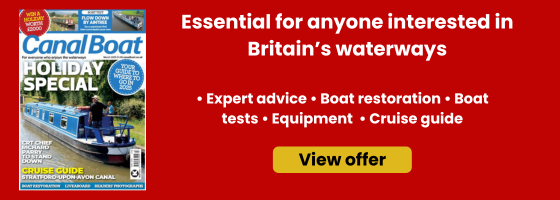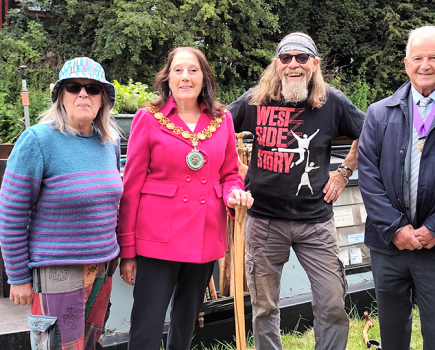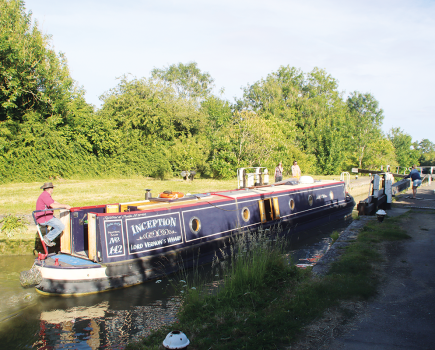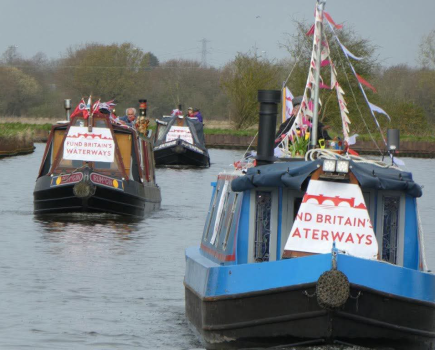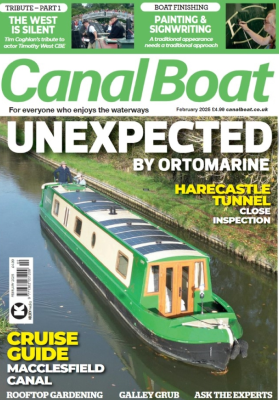Whether you are a boating novice looking to create a good impression or an experienced cruiser trying to help and advise, these guidelines from Steve Vaughan of Willow Wren Training are sure to set the right tone

The canals and rivers are lovely places to be. On the whole, people are friendly, courteous and helpful to each other. Just like anywhere in life, there is the odd person who isn’t, but most are considered to be “Considerate Boaters”.
So, what is the model for a Considerate Boater and what do boaters need to know about boating etiquette on the inland waterways? For the vast majority of boaters, it is second nature but for those new to the waterways there are several places where they can practise the art.

Mooring
The Considerate Boater always moors away from bridges, water points, winding holes, bends, lock approaches, opposite marina entrances, where there are signs forbidding or restricting mooring and anywhere else where there they might cause annoyance or an obstruction.
They are also mindful not to run their engines or make excessive noise at inconsiderate hours which might disturb other boaters or canalside properties.

When staying at popular mooring spots, the Considerate Boater will make the best use of the space available by mooring close to other boats and even crossing over their mooring ropes to reduce the required space. The other boater won’t bite (hopefully not). If you are feeling particularly friendly, and the channel is wide enough, then the Considerate Boater invites others to breast up alongside, (this is almost essential practice on many rivers or on the canals in London).
Anglers
The Considerate Boater slows down to tickover speed when passing anglers and sticks to the middle of the channel if possible or moves over if the angler(s) asks them to. Boating dog owners are also careful not to allow their dog to steal the angler’s maggots, like our Labrador tries.

Bridges and Narrows
On canals, protocol says that the one closer to the narrowing has priority. However, the Considerate Boater takes into account such things as the position of moored boats, cross winds and the lie of the bank either side of the narrowing to see if it makes life easier to give way to the other boat regardless of who is closer. (Note that on rivers, vessels heading upstream always give way to those coming downstream unless otherwise signed).

Hire Boaters
Many, (but definitely not all), hirers are new to boating and they might make mistakes. The mark of the Considerate Boater is to expect that it may happen and to make allowances.
There are plenty of places where the Considerate Boater can help novices:
• By offering to catch their line when they are coming in to moor on a windy day.

• By helping them through their first locks especially when you are waiting to go through after them.
• By giving advice gently with such phrases as “we always found it tricky until we tried…”
• When the occasional crash occurs, the Considerate Boater says that we have all done it and it was the reason you bought a steel-hulled boat, (unless of course you haven’t).
However, the Considerate Boater is mindful not to show novices how to take short cuts in case it goes wrong and they become liable for injury.
Locks
Before using a lock, the Considerate Boater always has a good look for anyone coming in the opposite direction and judges if the lock is set more in their favour. If the lock is wide enough for more than one boat they also see if they can share the lock with another boat to save water. When in a queue for a lock, the Considerate Boater gets their crew to go and offer help to others. They also readily help solo boaters as it saves time for the solo boater and for themselves.
Passing Moored Boats
It is the responsibility of a moored boater to tie up securely and it is true that many don’t or can’t. But, regardless of that, if the passing boat slows down to engine tickover speed then it should not matter how well the boat is secured.
A Considerate Boater knows that boat speed is the important factor not the engine speed so they give time for the boat to slow down. It is too late slowing the engine down when your bow reaches the moored boat, your boat will still be going too fast and creating wash.
Meeting Boats
Meeting other boaters should be a pleasurable experience. Always saying “hello” is standard procedure on the waterways. The normal practice is to slow down a little to reduce the bow wave and then pass port side, (left), to port side. However, Considerate Boaters are ready to pass on the other side if conditions demand such as when the other boat is having difficulty.
The Considerate Boater will also use the horn to give a long warning blast, (about five seconds), which means “Caution” when approaching blind restrictions and will be ready to react if they hear a horn blast themselves. They will also move over and give historic boats and pairs of boats the centre of the canal for their deeply drafted hulls.
Lift and Swing Bridges
Before operating a bridge that restricts foot or vehicular traffic, the Considerate Boater has a good look to see if road traffic or another boat is approaching to keep the disruption to a minimum. If they are the second boat to arrive at the bridge then they despatch their own crew to help.
They also keep bridges open for other boats when needed and don’t get too wound up if the other boat then overtakes. If a Considerate Boater is the one who has been allowed to overtake and the next stop is a lock, waterpoint or similar restriction then they will allow the other boat to use the facility first. A really good boater will even set the lock for them.
The Environment
A Considerate Boater will do what they can for the environment. They will use biodegradable washing liquids, formaldehyde-free toilet fluid or composting toilets and recycling wherever they find a recycling waste point. The Considerate Boater will respect the environment.
Tunnels
Tunnels can be quite threatening for the novice as they do their best to steer down what appears to be a very narrow, seemingly impossible, gap between the tunnel side and an oncoming boat. It isn’t helped when they cannot see anything in front because they are being blinded by the headlight of the approaching boat.
Considerate Boaters use headlights with just enough power to see their way through tunnels and avoid fitting a lamp which will melt the paint off an oncoming boat. They also angle their headlights up and to the right so they get a good view of tunnel side but reduce the forward glare.
Water Points
The Considerate Boater only moors at the water point for the minimum length of time possible and tries to moor in a way that makes the best use of the available space and allows other boats to tie up to wait. They don’t wash their boat on the water point when others need to use it.
Although there might be two taps at a water point, there is often only one supply feeding them and this can sometimes be a poor supply. If two boats connect at the same time the flow can sometimes be down do a trickle and it will take ages to fill the tanks. In this situation, the Considerate boater will wait for the first boat to finish before turning their own tap on.
Winding
Winding holes are another opportunity for the Considerate Boater to give due consideration by clearly signalling to other boaters of their intentions. There are horn signals that can be given and a good boater knows them. However, be aware that many will not be familiar with the signals so in this case, a hand being rotated in the air above your head will usually get the message across. The Considerate Boater will allow others to get past rather than hold them up while they wind.
If the boat ahead of you is the one doing the turning then stay well clear. It may be a novice boater trying it for the first time. Many hirers do not get a lot of practice winding because they are often following a cruising ring.
Finally
The Considerate Boater makes his/her way through the inland waterways in such a way that it doesn’t annoy or offend others. Basically, they treat others as they would like to be treated themselves. They don’t jump to conclusions or judge other boaters too quickly as it is so easy to be wrong. No matter how bad someone else is acting, the Considerate Boater doesn’t follow their lead.
Sometimes, whatever you do, others will misjudge the Considerate Boater and be offended. Don’t let that put you off. Stick to your mission and help to keep the waterways a lovely place to be.
See ConsiderateBoater.com for more information.
Contact:
For more information about Willow Wren Training and the courses they offer, visit www.willowwrentraining.co.uk or call 07970 770565
Beware of Captain Calamity causing chaos on the cut
What a great life this boating lark is, just risen from my sack, sun is high in the sky so another beautiful day awaits, I switch off the generator, if I don’t run it all night my fridge stops and the beer gets warm.
After mooring for 3 or 4 weeks at this spot, with its handy water tap right outside I decide it’s time to move on. Besides the smell from the carrier bags I stored in the hedge bottom is spoiling my lunchtime refreshment break.
I am lucky enough to have as bow-thruster that works well, so with a good long burst my home is in the centre of the canal in no time at all and I’m away. I marvel at the rainbow of colour on the water that follows me everywhere. I often think how pretty the designs are as my empty drink cans leave these magical colours on the cut, as far as the eye can see.
I am soon on my way to the next mooring, people are so kind at locks, even when my friends visit and we sit on the roof with a few tinnies other people seem to operate the paddles and gates with no need of our assistance, although it’s sometimes hard to see them through my exhaust smoke. This makes me realise why it’s pointless changing the oil as I generally put a fresh litre in a week.
I often observe people dancing on the lock-side dancing to my music from the ghetto blaster positioned handily on the roof, those twin 12in speakers certainly punch some good decibels as I play Guns and Roses or my favourite Def Leppard tracks. I wish I could hear what they are shouting as we leave the lock with our magnificent bow wave washing up either side of the canal.
It is good to show your boating skills as you overtake other boats going in the same direction, never sure which side to pass but a good old blast on the horn is often given as a signal for me to barge past.
I respect my engine and never take it over 3,500 revs: you can see the appreciation on the other boaters faces as they wave frantically at me (at least I think they’re waving) as I pass their moored craft. It is not very long before I spy another superb mooring spot, and I cannot understand why no one else is moored there. Soon my mobile home is moored, once again I have a handy water tap just outside the galley window.
I like to moor early in the afternoon so I have time to set up my sturdy generator, chairs, barbecue, workmate, etc.
It is round about now I let my two dogs (Fender and Cratch) loose for a good run along the towpath, sometime they are gone for an hour or more, but a good healthy run is what they need and it gets them off the boat. I then settle down with a few cans and admire the iridescent colours around the cans I have lobbed into the water.
Often when I am relaxing watching boats pass by I wonder what the little coloured square pieces of paper are that adorn the stern windows of these craft, are they disabled mooring permits or perhaps they are members of some exclusive club?
Who knows, anyway let’s turn up the volume, relax and enjoy this great life, I hope one day to bump into you and make some more friends.
Yours in deep water,
Bob Inalong
Thankfully our canal community is more civilised that Bob Inalong suggests… and we enjoyed his tongue in cheek observations!
Image(s) provided by:
Martin Ludgate


